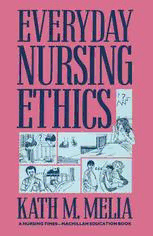Table Of ContentEVERYDAY NURSING ETHICS
Other titles by Kath Melia
Nursing Ethics (with I. E. Thompson and K. M. Boyd)
Learning and Working: the occupational socialization of nurses
EVERYDAY
NURSING
ETHICS
KATH M. MELIA
B.Nurs. (Manc.), Ph.D.
M
MACMILLAN
© Kath M. Melia 1989
All rights reserved. No reproduction, copy or transmission
of this publication may be made without written permission.
No paragraph of this publication may be reproduced, copied or
transmitted save with written permission or in accordance with
the provisions of the Copyright, Designs and Patents Act 1988,
or under the terms of any licence permitting limited copying
issued by the Copyright Licensing Agency, 33-4 Alfred Place,
London WCIE 7DP.
Any person who does any unauthorised act in relation to
this publication may be liable to criminal prosecution and
civil claims for damages.
First published 1989
Reprinted 1991
Published by
MACMILLAN EDUCATION LTD
Houndmills, Basingstoke, Hampshire RG21 2XS
and London
Companies and representatives
throughout the world
Typeset by Wessex Typesetters
(Division of The Eastern Press Ltd)
Frome, Somerset
British Library Cataloguing in Publication Data
Melia, Kath M.
Everyday nursing ethics.
1. Medicine, Nursing. Ethical aspects
l. Title
174'.2
ISBN 978-0-333-47152-4 ISBN 978-1-349-10399-7 (eBook)
DOI 10.1007/978-1-349-10399-7
CONTENTS
Preface Vll
Introduction 1
1 To lie or not to lie? 4
2 Measuring freedom 10
3 Cruel to be kind? 16
4 Whose morals are they anyway? 22
5 Balance of power 28
6 Whose side are you on? 34
7 Justice for all 40
8 The search for objectivity 45
9 An easy death? 51
10 Acts of faith 59
11 To tell or not to tell 65
12 Ethics in context 72
Further reading 81
Index 83
v
ACKNOWLEDGEMENTS
The author and publisher wish to thank Nursing Times for permis
sion to reproduce articles which appeared originally in the journal
within the Series 'Everyday Ethics for Nurses',
VI
PREFACE
As a practical introduction to nursing ethics Everyday Nursing
Ethics is for both nursing students and qualified nurses. It takes a
case-based approach to a range of issues which confront all nurses
and challenges them to think about the ethical dimension of their
work. Nurses working in daily clinical contact with patients should
be able to identify with at least some of the cases and so be able to
use the book within their practice rather than viewing ethics as
some kind of ivory tower philosophical discussion which does not
relate to practice. Nursing students will find the book a stimulating
resource which sets theory firmly into practical settings.
Each chapter deals with an important issue. In a brief and readable
way it introduces the relevant ethical theory which is then developed
so that the reader can build up an understanding of the different
arguments that have been put forward by key moral philosophers
in order to justify particular moral stances. These arguments are
illustrated by relating them directly to a case so that the reader can
see how ethical debate works. The cases quoted are, for the most
part, not the dramatic ethical dilemmas; rather they are about the
everyday realities which nurses face when ethical decisions are being
taken or have been taken. So the book is not about 'do we turn off
the machine?' but more about 'what are the implications for nurses
in a personal and professional sense when the machine is turned
off?'
It is important to realise that the book is not about deciding what
is right and wrong in nursing practice. Each of us is entitled to a
position and so no one should be excluded from voicing an opinion
this is the essence of true ethical debate. However, discussion is
likely to be more constructive if we have a clear idea about how to
VB
put arguments together, and an insight into the reasoning behind
the moral positions we take.
The book is designed for use by individual nurses or as a
basis for ward or classroom-based group discussion. Each chapter
includes points for discussion; an annotated bibliography at the end
of the book will enable readers to take the issues further.
Vlll
INTRODUCTION
Writings on things ethical are becoming popular both in the general
and the nursing press. Whether this interest in moral issues would
have reached its zenith without advances in medical technology,
cutbacks in the health service, violence against women and children
and, of course, the arrival of AIDS, remains one of life's imponder
ables. Whatever the cause, nurses are becoming increasingly interes
ted in the ethical dimension of their care, and rightly so.
Moral problems and ethical issues need not always be of dilemma
proportions. In day-to-day nursing there are occasions when we
have to make decisions which have moral overtones. We make
choices, for instance, not only about where to put material resources
but also resources in the form of ourselves, our time and our effort.
Moral dilemmas of the 'do or die' variety help us to focus upon the
moral choices we must make, and so debating ethical dilemmas is a
useful exercise. We should not, however, allow the big dilemmas
to detract from the more routine moral choices involved in
nursmg.
Take for example, a simple and all too common situation - a
shortage of sheets. It is 7.30 am and a ward of 30 geriatric patients
has only 18 sheets for the day. The advice from the nursing officer
is to 'use them sparingly'. There are clearly practical and political
issues here - questions of organisation and resource allocation. Yet
for those confronted with the situation there remains the question -
who gets the sheets? How are decisions made? Which patients will
have to manage without?
Nurses in such a situation have to make choices of a practical
and moral nature - how? Beyond the who gets the sheets question
is the wider issue of how should nurses react to such a shortage.
One option would be to take nursing'S time-honoured approach of
1

